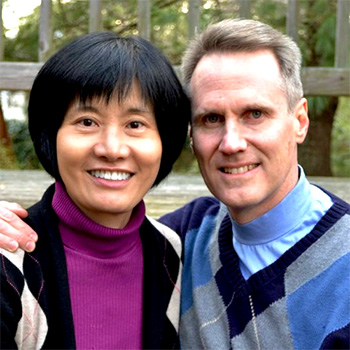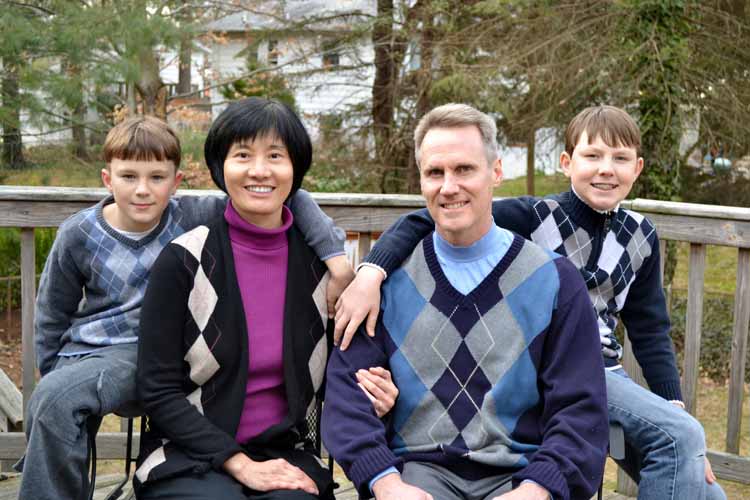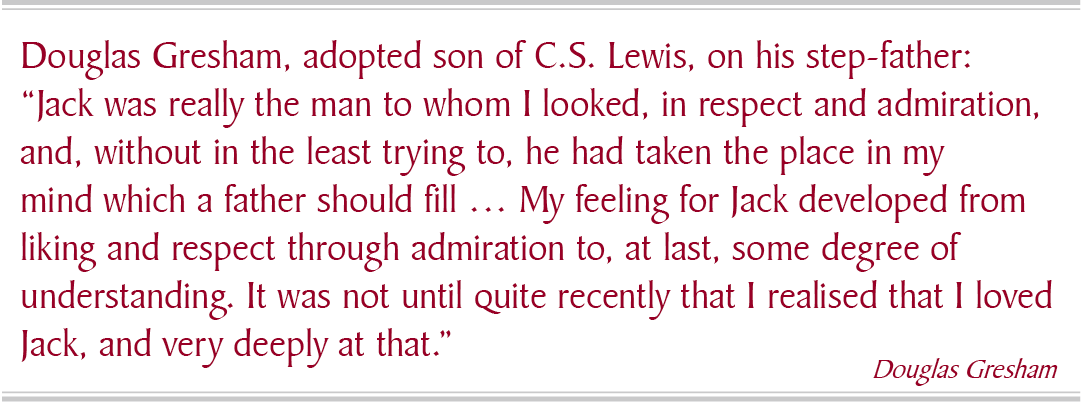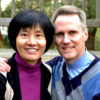Back to series



From Russia with Blessing
Click here to open a Print - Friendly PDF
We sat eagerly, anxiously on the edge of chairs in an orphanage director’s office in the Siberian countryside. Finally a skinny soon-to-be-nine-year-old with a buzz cut walked in shyly, averting our eyes but then overcome with curiosity—a few quick glances of suspicion.
We looked at this little stranger and then at each other, silently communicating our puzzlement: he doesn’t look anything like the photo we received. Perhaps he had grown a bit. Or maybe we weren’t seeing straight after two overnight flights and a several-hour car ride. A photo and the names of two brothers. That’s all we had to go on. We smiled and waited a few minutes until a six-year-old joined us: cute, active, but again we noted little resemblance to the photo.
You might guess, by this point the photo didn’t really matter. For a few hours we were meeting in the flesh with the boys who would become our sons. Six months later we would return to Russia to complete the adoption process and mark a significant life transition.
We were both fairly content forty-something singles when we married. After the initial steep learning curve on living out the marriage covenant, we decided to add a couple of school-aged children to the household. This means that in less than three years, Allison went from being a condo-dwelling, frequently traveling professional single to a suburban homemaker and full-time mother of Russian-speaking elementary schoolers. Steve’s transition was less dramatic but not without challenges.
Now, several perspective-giving years later, we’re reflecting on what we’ve learned and how God is working in us personally.
Misplaced Love
Our relatively quick middle-aged transition into marriage and parenthood was an especially effective magnifier of indwelling sin that was easier to mask or ignore when we were single. Although various previous experiences had graciously aided in exposing our sinfulness, we now saw it from new perspectives. Having both completed two years of the C.S. Lewis Institute Fellows Program shortly before our marriage, we’d read extensively about the sin that so easily entangles. Now the reality was hitting harder.
For me (Steve), marriage revealed my bent toward self-centeredness—my failing to notice and be sensitive to my wife’s needs and desires; resisting impingements on my schedule; avoiding involvement with other people’s issues except when convenient; hesitating to involve others in my decision-making processes; fighting bitterness for having to limit or give up some of the good things I was involved in. I had long considered Philippians 2:3–6 to be one of my favorite passages:
In humility consider others better than yourselves . . . Look not only to your own interests, but also to the interests of others. Your attitude should be the same as that of Christ Jesus: Who, being in very nature God, did not consider equality with God something to be grasped, but made himself nothing . . .1
Would this still prove to be a favorite when tested more intensely, by marriage and then by children? Serving our family full time, Allison became aware of her reliance on the ego strokes gained in the workplace and how her professional status had become a critical source of her significance. Moving from a “competent” employee to an “incompetent” mom revealed new emotional weaknesses and fears. Second Corinthians 12:9 took on a deeper, more personal meaning: “But he said to me, ‘My grace is sufficient for you, for my power is made perfect in weakness.’ Therefore I will boast all the more gladly about my weaknesses, so that Christ’s power may rest on me.”
For both of us, uncharacteristic anger and impatience were triggered by the boys’ typically childish behavior. What had happened to the 1 Corinthians 13 love that is not easily angered and keeps no record of wrongs?
At root, the changes in our circumstances helped us see more clearly where our affections really lay, how much we loved ourselves—our positions, our comfort, how others responded to us, our perception of what others thought of us—to the detriment of loving God and others.
As we encountered more hour-by-hour opportunities to put others’ interests in front of our own, we saw more occasions to be discouraged by our repeated failures as well as more incentive to call out to God for help and trust His nudges toward self-forgetting love.
Knowing, Doing, Loving
 Both of us, somewhat introverted, naturally gravitated toward relatively routine, ordered lives that kept the untidiness of relationships at a comfortable distance. Of course, in our marriage this pattern became impossible when dealing with each other and even less possible after being graced with two sons, one of whom is temperamentally our polar opposite in his ability to engage others in the moment. These past few years have definitely brought increasing opportunities to experience the enmeshed relationship of knowing, doing, and loving.
Both of us, somewhat introverted, naturally gravitated toward relatively routine, ordered lives that kept the untidiness of relationships at a comfortable distance. Of course, in our marriage this pattern became impossible when dealing with each other and even less possible after being graced with two sons, one of whom is temperamentally our polar opposite in his ability to engage others in the moment. These past few years have definitely brought increasing opportunities to experience the enmeshed relationship of knowing, doing, and loving.
We think back to our first trip to Russia with the names of two boys and a photo. While we’ve heard about adoptive parents who fell in love with their soon-to-be kids after seeing a photo, we can’t say that happened to us. (And a good thing we didn’t. About a year after being in our home, our older son, flipping through a picture book, asked, “Why do you have a picture of Max and his brother from the orphanage?” “Well, we were told that Max in that photo was you.” “No way. And his brother was totally crazy!”)
We suppose it’s possible to develop fairly strong feelings from a photo, but falling in love with the picture is not the same as loving the flesh-and-blood person. You can make a commitment to love that person, and you could even initiate loving deeds from a distance. We had sent toys and cards with nice words to these boys in the photo. But love could deepen only through being with these boys, tending their wounds, hearing their laughter, holding their hands, engaging with their personalities. And the test of whether the commitment to love would persevere was whether we would continue to pursue what is best for them after knowing them in the flesh. Experiential knowledge allows a deeper love but can also expose the shallowness of what we think love is.
Although we made a commitment to love these boys after that brief and awkward interaction on our first trip to Russia, tests to that commitment came quickly. With little ability to communicate with them, sharing no common life experiences, seeing no resemblance to us in them, our first days as an adoptive family felt more like full-time babysitting than affectionate parenting. But we worked at putting our commitment into action, sometimes willingly and successfully, at other times with “an attitude.”
We tried to understand what it was like for our sons to be suddenly immersed into a totally new culture and language with strangers as parents, grandparents, and cousins; we tried to understand the sources of their fears and frustrations, what communicated love and security to them, what helped them see their own need for Christ. The more the commitment was worked out in action, the more the knowledge grew, and as the knowledge grew, the love was deeper, the affections developed, bringing more joy to the acts of love.
This reminds us of what Jesus said as recorded in John 14:21: “Whoever has my commands and obeys them, he is the one who loves me. He who loves me will be loved by my Father, and I too will love him and show myself to him.” Love is evidenced by obedience to what we know. And as we obey, the relationship deepens, more is known, and love increases. As we’ve experienced this to some degree in our family life, we want to keep asking: Is my knowledge of God and His commands increasing so that my love can deepen?
Or do I just love a photo of God? And is that photo I have even a correct photo? Am I consistently obeying what I do know, practicing the disciplines and engaging with His followers in ways that allow the knowledge to grow? Am I embracing the circumstances God has woven so I can know Him better and love Him more deeply? “I want to know Christ and the power of his resurrection and the fellowship of sharing in his sufferings, becoming like him in his death, and so, somehow, to attain to the resurrection from the dead” (Phil. 3:10–11).
Captivating Love
One of the first English words our younger son learned was up. One night shortly after our sons came to our home, when they were playing music in the basement, we spontaneously picked them up, started swinging them around, dancing. A big hit; they kept playing the same tracks of music over and over, pleading with us “up, up.” This would go on until we were ready to drop; but seeing our children’s unrestrained, fully in-the-moment faces motivated us to keep going—especially the face of our older son who had arrived with so many fears and hesitations; in those moments all fears were drowned out. The totally unself-conscious display of pleasure placed these moments among the best memories of our early relationship.

Perspective-giving moments like those have been important to us, countering others that remind us of our foolishness and failures as spouses and parents. As the feel-good tonic of professional accomplishment grows more illusory, we have grown more open to being captivated in special moments of God-sent delight. At a deeper level we understand and feel the enduring, unchanging love of the one who took the very nature of a servant, humbling Himself and becoming obedient to death, even death on a cross, so that we may be citizens of heaven who look forward to the day when our lowly bodies will be like His glorious body; when we will fully experience the inheritance that will never perish, spoil, or fade. Beholding, setting our hope fully on that loving grace is the greatest stimulus to deepen our knowledge and love.
God has dealt with us gently and tenderly. Unlike many, our journey thus far has not been plagued by severe or compounded trials. No serious health or financial tests to this point. God gave us sons who have been generally happy and relatively easy to parent. We’ve been blessed with supportive family, church community, and friends. Even though our circumstances have not been extraordinary, and have been mundanely pleasant of late, we want to stay alert to the nudges to put aside our self-focus and delve into the depths of His lavish love. To be captivated in being fully known, fully loved.
And this is my prayer: that your love may abound more and more in knowledge and depth of insight, so that you may be able to discern what is best and may be pure and blameless for the day of Christ. (Phil. 1:8–10)
| Notes 1. Scripture quotations are from the New International Version. |
|||

Steve and Allison King
CSLI FellowsSteve and Allison King, CSLI Fellows, Steve has served as an attorney at Gammon and Grange PC since 1995 and is currently the managing owner of Gammon & Grange, P.C. and co-directs its Exempt Organizations Practice Group. He enjoyed participating in the C.S. Lewis Fellows program from 2003-2005. Allison has worked for The World Bank in human resources and for Mobil Chemical Company in business development. She was a C.S. Lewis Fellow from 2005-2007 and her group continues to meet regularly.

 COPYRIGHT: This publication is published by C.S. Lewis Institute; 8001 Braddock Road, Suite 301; Springfield, VA 22151. Portions of the publication may be reproduced for noncommercial, local church or ministry use without prior permission. Electronic copies of the PDF files may be duplicated and transmitted via e-mail for personal and church use. Articles may not be modified without prior written permission of the Institute. For questions, contact the Institute: 703.914.5602 or email us.
COPYRIGHT: This publication is published by C.S. Lewis Institute; 8001 Braddock Road, Suite 301; Springfield, VA 22151. Portions of the publication may be reproduced for noncommercial, local church or ministry use without prior permission. Electronic copies of the PDF files may be duplicated and transmitted via e-mail for personal and church use. Articles may not be modified without prior written permission of the Institute. For questions, contact the Institute: 703.914.5602 or email us.
-
Recent Podcasts
The Road Back – Trevor Lancon’s Story
by Trevor Lancon, Jana Harmon on November 15, 2024Deeply involved in his church’s youth group, Trevor...Read More
-
From Politics to Pampers
by Michelle Morgan Knott, Aimee Riegert on November 15, 2024
-
An Unexpected Change – David Westerhoff’s Story
by David Westerhoff on November 8, 2024
-
Recent Publications
Will You Be Ready?
by Thomas A. Tarrants on October 23, 2024Tom Tarrants gives insights on how we can...Read More
-
Should Christians Be Involved with Politics?
by Kerry A. Knott on October 1, 2024
-
Isn ’t Atheism Based on Scientific Fact Whereas Christianity is Based on “Faith”?
by Cameron McAllister on September 1, 2024
0
All Booked
0.00
All Booked
0.00
All Booked
23169
ADVENT CALENDAR: The Amazing Prophecies Fulfilled by the Birth of Jesus Christ
https://www.cslewisinstitute.org/?event=advent-calendar-the-amazing-prophecies-fulfilled-by-the-birth-of-jesus-christ&event_date=2024-11-28®=1
https://www.paypal.com/cgi-bin/webscr
2024-11-28

Next coming event
Days
Hours
Minutes
Seconds
ADVENT CALENDAR: The Amazing Prophecies Fulfilled by the Birth of Jesus Christ
On November 28, 2024 at 6:00 amTags
Speakers

Steve and Allison King
CSLI Fellows
Team Members

Steve and Allison King
CSLI FellowsSteve and Allison King, CSLI Fellows, Steve has served as an attorney at Gammon and Grange PC since 1995 and is currently the managing owner of Gammon & Grange, P.C. and co-directs its Exempt Organizations Practice Group. He enjoyed participating in the C.S. Lewis Fellows program from 2003-2005. Allison has worked for The World Bank in human resources and for Mobil Chemical Company in business development. She was a C.S. Lewis Fellow from 2005-2007 and her group continues to meet regularly.





